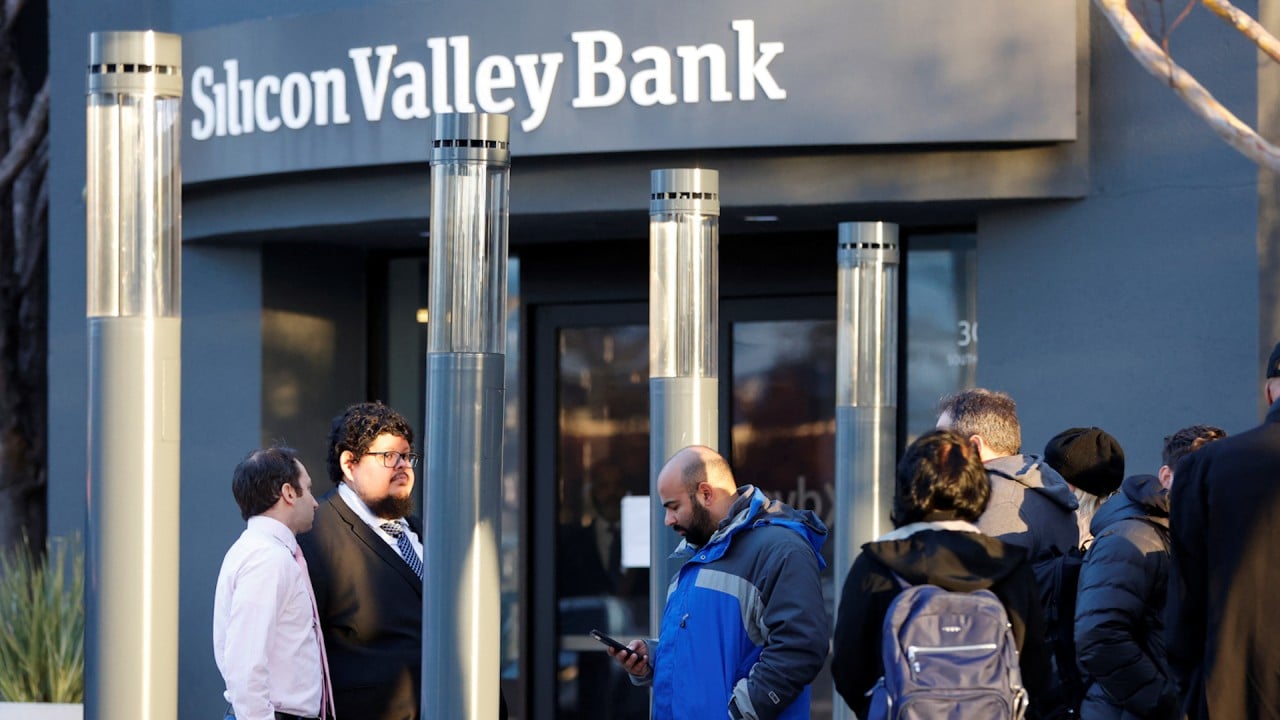[ad_1]
If you look at the list of major SVB depositors, a clear pattern emerges of companies that have been listed and valued at billions of dollars, focused on growth at all costs, without so far turning a profit.
These hi-tech enterprises have only known life with insignificant inflation and negligible debt service burdens. Their heroes are companies like Tesla, which lost money for 17 years before at last in 2020 reporting profits, or Uber (profitless since being founded in 2009), Snapchat (eight years in loss), or WeWork.
The Tesla logo is displayed on a screen at the New York Stock Exchange on August 27, 2018. Tesla lost money for 17 years before at last in 2020 reporting profits. Photo: AFP
Even now, they have barely felt the bitter discipline of “normal” debt service. The US Federal Reserve only began raising interest rates in March last year in an assault on “transitory” inflation.
For most companies (or families with mortgages), the impact of higher interest rates is yet to be felt. But the warning signs are clear. The International Monetary Fund, in its Global Debt Monitor released in December (and only reporting debt levels to the end of 2021), paints a nerve-racking picture. Global debt rose at the end of 2021 to a record US$235 trillion.
As volatility surged during the global pandemic, debt as a percentage of GDP whipsawed up by a record 29 percentage points in 2020, to 257 per cent, and only moderated in 2021 to 247 per cent because GDP jumped worldwide as we emerged from the shadow of Covid-19.
S&P Global has calculated that over the first half of 2022, global debt rose to a record US$300 trillion – equivalent to US$37,000 per person worldwide. It warns that the debt-to-GDP ratio will rise to an unprecedented 366 per cent by 2030, resulting in the need for a “great reset”, with more cautious lending, a fall in discretionary spending, the necessary restructuring of low-performing enterprises, and significant debt writedowns worldwide.
Already, according to Datastream, global stock markets have over the past year lost US$15 trillion in value. This was before the massive market sell-off that followed the bank collapses and rescues of the past month. CBS recently reported that the value of the US housing market last year fell by US$2.3 trillion (4.9 per cent) as higher mortgage rates loom.
Unsurprisingly – and originally addressed by economists at the Bank for International Settlements – between 5 and 10 per cent of US companies are already technically “zombies”, lacking the earnings needed to service their debt costs.
In Hong Kong, according to Enoch Yiu here in The Post last September, around one fifth of Hong Kong’s listed companies are “overextended and unable to pay interest debt”. And all this was due to the pandemic, without the added burdens of inflation, potential recession, and soaring debt service costs as interest rates rise.
Nouriel Roubini at New York University’s Stern School of Business, who gloomily but with great accuracy foresaw the 2008 crash, is once again wringing his hands, warning recently that “the risks are even more severe today than in 2008”.“[There is a] serious risk of a systemic meltdown in US financial markets as huge credit and asset bubbles collapse,” he said.
Other Cassandras include the IMF’s Kristalina Georgieva, who has warned of “a confluence of calamities”. Her economists have warned of a debt landscape that is increasingly complex: “The adequacy of debt reporting and disclosure is not keeping up with debt complexity [which] undermines good fiscal management and accountability.” They list nine countries already in debt-distress, and a further 27 at high risk.
The World Bank, surveying sovereign debt worldwide and noting that the world’s poorest countries are already spending 10.3 per cent of their export earnings to service external debt, also talks of “falling confidence in an environment of elevated debt”.
It said in its Global Economic Prospects report in January 2023: “Urgent global policy efforts are needed to mitigate the risk of global recession and debt distress in emerging markets and developing economies, address climate change, and support people affected by crises and hunger.”
In short, those who see our present crisis as the creation of a few lax banks have their heads in the sand. This is not a time for kicking cans down the road.
David Dodwell is CEO of the trade policy and international relations consultancy Strategic Access, focused on developments and challenges facing the Asia-Pacific over the past four decades
[ad_2]
Source link

